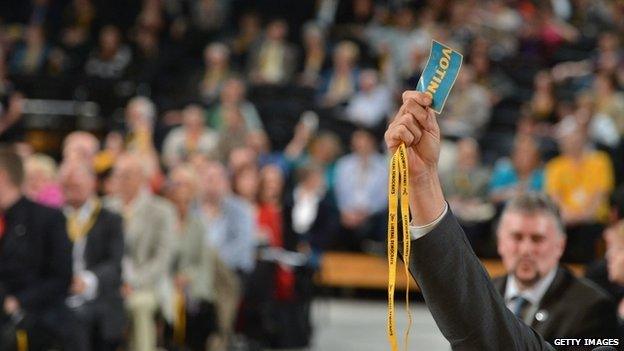Referendum: Deal is on ... almost
- Published

Much of the talk on the fringe of the Lib Dem conference is of an emerging referendum deal
Much talk both at Holyrood and on the fringe of the Liberal Democrat conference in Brighton anent the emerging deal on an independence referendum.
Nothing, of course, is settled until it is all signed off by both governments, Scottish and UK. But that need not prevent us from having a little fun spotlighting the troublesome issues and the likely outcome.
As billed on this site previously, one issue is what requires to be placed in statute and what should be in an accompanying memorandum.
More, there is a fairly clear-cut division between the two sides over the issue of campaign spending limits. Broadly, the Scottish government wants to stick to the limits set out in its detailed proposal, published in January this year.
That envisaged that a "designated organisation" (Yes Scotland and Better Together) could spend up to £750,000; with a political party at Holyrood able to spend £250,000; "other permitted participants" free to chip in £50k; and individuals limited to £5k.
Nationalist sources say that the UK government side wants rather more than this - perhaps double the proposed limits. Nationalists are presently unwilling to allow this - or indeed anything else - to be laid down as a condition for endorsing a deal.
But neither side sees this as an insurmountable obstacle. Ditto discussions over the number and duration of campaign broadcasts. Important - very important - but not deal-breaking.
Necessary power
Indeed, the tone on both sides is notably conciliatory. Perhaps for two reasons.
This really matters: it is deeply serious politics. The voters would not understand or forgive petty politics or its grim counterpart, bombastic grandstanding.
A relationship has been built up between the Scottish government and the Scotland Office (who are leading for the UKG). That relationship of relative trust was enhanced during the prolonged negotiations over the Scotland Bill which extended Holyrood's powers with, eventually, the agreement of the Scottish government (despite their belief that it fell short of what was required.)
Which leaves us where?
I believe the following will happen. Officials from both sides will prepare a final, composite package. This will be put before Nicola Sturgeon and Michael Moore within the next fortnight or so.
If agreed in detailed form, this would then go to a meeting between Alex Salmond and David Cameron for final ratification. That meeting might be expected in mid October.

Scottish Secretary Michael Moore will meet Nicola Sturgeon in next fortnight
Westminster would then legislate via an Order, scrutinised by both Houses of Parliament, to transfer the necessary power to Holyrood to hold a legally watertight referendum on independence. That order would be time-limited: that is, the power would be transferred for the pending referendum only, not for ever and a day.
And the referendum itself? The Scottish government would finally accept that the ballot would be upon a single question: yes or no to independence. That would be in statute. Suggestions, therefore, of a further question on Devo Max or Devo Plus would be shelved.
Politically, the SG would argue it had achieved the prize of a legally protected plebiscite. SNP ministers would argue further that they had sought to widen the choice - and would invite supporters of Devo Max to shift their loyalty to independence.
Politically, the UKG would argue that it had established the clear, straightforward choice which Scotland needs. Implementing the SNP mandate, as Michael Moore cheekily describes it.
The franchise would be extended to include 16 and 17 year olds - with a concomitant debate over which side in the campaign will gain thereby.
As to the question itself, I believe it will be agreed that it should be in the hands of Holyrood - provided it is fully tested by the Electoral Commission. The SG has, in fact, already agreed this approach. I expect the UKG to follow the same line.
I would, therefore, expect the Scottish Government to put forward its proposed wording which is "Do you agree that Scotland should be an independent country?" It would then be up to the Commission to test this question rigorously: is it fair? is it widely comprehensible? would it provide a decisive outcome?
The Commission might, for example, suggest that the words "agree" and "disagree" might both appear on the ballot paper. But that would be up to them, following exhaustive tests and consultation.
In short, a deal is on. Stand by for the referendum.